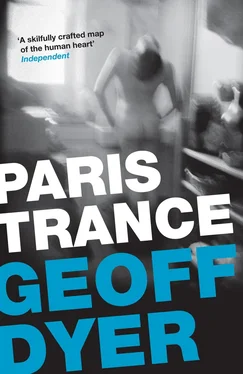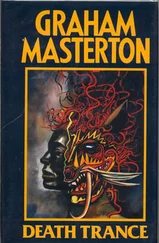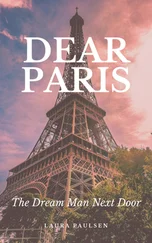Except the photographer’s bike turned out to be in very poor repair. It was hanging on a rack in the damp courtyard, the tyres were flat, the seat was too low, the back brake rubbed. .
‘Shit!’ Luke kicked the front wheel in disgust and disappointment. ‘No wonder he left it with me. It’s completely fucked.’
‘We can fix it.’
‘It’ll take all day. And I hate getting my hands all oily.’
‘I’ll do it,’ said Nicole. ‘It takes twenty minutes.’
‘I don’t have any fucking tools.’
‘You swear too much,’ said Nicole. ‘I have tools. In my bag.’ She even had a puncture repair kit. Luke went back up to the apartment to get a bowl of water to test the inner tube for punctures. While he was there he rolled a joint. When he came down again, the bike was upside down and Nicole was taking the front wheel off.
‘What’s that in your hand?’ he said.
‘A spanner.’
‘Ah, I thought as much. Very evening class. And what are you doing with this so-called spanner? Loosening something I’ll be bound.’
‘Yes. It’s almost ready.’ Luke crouched down and watched. Nicole fixed the puncture and eased the inner tube back on to the wheel and into the tyre. Then she fitted the wheel back between the forks. She stood up and swept the hair out of her eyes with the back of her hand, leaving a smudge of oil on her forehead. She flipped the bike over and made some further adjustments.
‘You like fixing things,’ said Luke banally.
‘Things break.’
‘Whereupon one throws them away.’ She did not look up. ‘Bicycle maintenance,’ Luke went on. ‘It’s never been a strong point of mine.’
‘What are your strong points?’
‘That’s the thing. I don’t actually have any.’
‘The lasagna was nice.’
‘Thank you.’
‘And you kiss nicely.’
‘Don’t tell me, tell your friends,’ said Luke. ‘What are you doing now?’
‘Tightening something.’
‘Tightening and loosening,’ said Luke. ‘Such is the dismal life of the spanner.’
‘Sit on the saddle,’ said Nicole. ‘To check the height.’
Luke straddled the bike. ‘That’s perfect.’
‘Sure?’
‘Yes.’
‘You see, it was easy,’ said Nicole, clearing the tools away. ‘How long did it take?’
‘About two hours. And the saddle is way too high. I can hardly touch the floor.’
‘No!’
‘Joke. And the repairs only took half an hour. But your hands are covered in oil.’
She washed them in a puddle.
Her bike was a red racer, tuned to perfection, stripped to sleek essentials: thin tyres, strapless toe clips, no mud guards, rack or saddle bag. It hummed. Luke’s rattled, clanked and rubbed. Nicole said she would fix it properly next week. After they had been cycling for twenty minutes they came to the botanical gardens and sat there for a while.
‘Would you like to get stoned?’ said Luke.
‘Stoned?’
‘Smoke dope. Get high,’ he said, holding up the joint he had made.
‘OK.’
They set off again, cycling aimlessly. Nicole had taken off her suede jacket and tied it round her waist. Everywhere they went they saw green-overalled Africans cleaning up litter and dog shit. Parisians have always been terrible litterers — why bother throwing cans in a bin, or training your dog to crap in a gutter when there are all these silent Africans to tidy up after you? — but now they had an excuse: most of the litter bins in the city had been sealed in the wake of fundamentalist bomb attacks. A poster for Le Pen was overshadowed by an advertisement for the United Colours of Benetton. They were partners of a kind, it didn’t matter what either of them said or stood for: all that counted was that the names — Le Pen, Benetton — stuck in people’s minds. They spoke the same language, a language in which there were no verbs, only nouns: names and brand-names. Both were dwarfed by the billboard which displayed the global apotheosis of this tendency: ‘Coke is Coke’.
Construction work was in progress everywhere. Great swathes of the city were being demolished and redeveloped but wherever they went they saw cafés they intended, one day, to return to. Roller-bladers, solitary or in packs, roamed swiftly through the dream-time of the city. Stoned, Luke found himself looking forward to a time when not having learned to roller-blade would be one of the major regrets of his life. They followed buses, cut through parks, crossed over railway lines, annoyed drivers, skirted traffic jams and orbited churches whose names they made no attempt to establish. After two hours they were hopelessly lost.
‘Let’s go in here then,’ said Nicole, pointing at a shop specialising in maps and atlases.
‘How convenient. Like having an accident outside the hospital or getting robbed outside the police station.’
Inside, variously projected maps of the world were arranged in large V-shaped racks. They turned the polythene-protected posters as if they were choosing a picture of Che or Hendrix in an Athena shop at the dawn of the poster era. The selection was vast: maps showing population density, per capita incomes, political boundaries, mineral deposits, annual rainfall and physical features. In the standard Mercator projection the world looked swollen and robust, bursting with prosperity and confidence. Great Britain was slap bang in the middle of things, about half the size of India. In a newer, alternative projection the world looked sad and thin, dripping towards Antarctica. Little Britain on this projection was barely visible, a streak that looked hardly worth invading.
‘Where would we be without maps?’ Nicole asked rhetorically.
One rack held only antique reproductions, olde maps drawn in different versions of the same buried treasure aesthetic, zephyrs blowing galleons across the whale-crowded sea towards jagged coastlines of indeterminate exactness. Another held maps of the oceans, great stretches of contoured blueness; in another were maps of space: the Moon, Mars, the stars.
There was also a selection of globes which were immune to the vagaries and distortions of projection. Some were actually lights, contained their own suns, glowed from within. The Moon was uniformly grey, nothing like as nice as the Earth which was greenish and deep blue. Still, it was the Moon and, as such, they felt drawn to it.
‘The Sea of Tranquillity,’ read Luke.
‘Easter Sea.’
‘Ocean of Storms.’
‘Bay of Dew.’
‘Sea of Crises.’
‘Sea of Nectar. It makes you wish there were places on Earth with names like that,’ said Nicole, but there was no disguising the fact that, names aside, the Moon was a pretty crummy place. ‘Look,’ she said. High up on one wall was a satellite photo of the Earth seen from space. Flattened out to show the entire planet, it looked exactly like a map of the world.
‘That’s the only thing the Moon’s got going for it, really,’ said Luke. ‘You get a great view of the Earth.’
‘It’s the best planet, isn’t it? We’re so lucky to live on it.’
‘None of the others come within a million miles of it.’
They had succeeded in putting the afternoon in a massive, dwarfing context. Re-entering the earth’s atmosphere, they went down to the basement where the maps of individual countries were kept, maps showing regions within a country, states and counties, folded street plans of crowded cities — London, Rome, New York, Cairo, Moscow — that showed every avenue and street, every cul de sac and alley of the city they were in. There was even a diagram, on the wall, of the shop itself, a map of maps with a red arrow saying, ‘You Are Here.’
‘I feel better able to face the world,’ said Luke. Better able, he meant, to face the journey home — not the Ancient Egypt section of one of the city’s daunting museums.
Читать дальше












